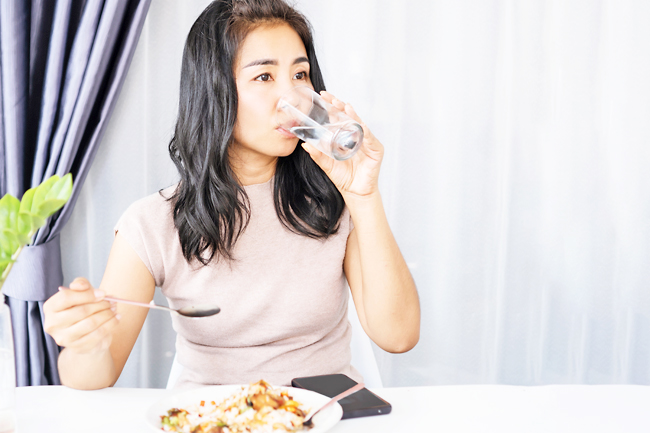Sabine Meuter
THE STAR/DPA – Is it okay to drink something during a meal?
This is a question raised particularly by parents of young children, many of whom were taught by their own parents that you shouldn’t drink anything until after a meal.
The rationale is that ingesting fluids dilutes stomach acid, thus disturbing digestion.
Is this true?
“There is indeed a kernel of truth in that,” said Dr Johannes Georg Wechsler, president of the Federal Association of German Nutritional Physicians (BDEM).
“If you drink a lot during a meal, you do, in fact, cause a dilution of stomach acid.”
He doesn’t advise drinking nothing at all while you’re eating though.
A word about stomach acid: Your body produces up to four litres of it daily.

It breaks food down into its individual constituents for further processing.
It also kills most of the germs we ingest with our food that haven’t been killed by the saliva in our mouth.
Rita Rausch, a food and nutrition expert for the consumer advice centre in the German state of Rhineland-Palatinate, also sees nothing wrong with drinking something while eating.
“A glass of water during a meal doesn’t hurt – on the contrary,” remarked Rausch, who says it helps to transport the food chewed and mixed in the mouth with saliva into the stomach, and from there, the intestines.
But she expressed understanding for the mealtime rule in some families to eat first and drink afterwards.
“It’s often apt when children don’t get much enjoyment out of eating,” she said, surmising that parents are worried a drink will distract from the food, causing the child to eat too little and become undernourished.
“You can strike a compromise in such cases,” she said.
Her suggestion: Allow the child to drink something while eating, but only one glass, the contents of which have to be spread out over the entire meal.
If it’s okay for kids to drink during meals, what should it preferably be?
“Water, so that they really taste the food,” said Dr Wechsler, adding that it doesn’t matter whether it’s tap or bottled water, carbonated or not.
Although many adults drink sodas or juices with meals, “this ends up masking the taste of the food”, he said, adding that these are high in calories.
For those who turn up their noses at a glass of water during meals, she suggested unsweetened fruit tea as an alternative.
Having a glass of water before a meal can be a good idea too, Dr Wechsler said, “especially for people who have to watch their weight or are on a slimming diet”.
The water stretches your stomach, creating a feeling of being mildly full that diminishes your appetite and makes it more likely you’ll eat less, he explained, “although there’s no scientific evidence that drinking water makes you slim”.
Be it before, during or after a meal, “it’s best when the water you drink is lukewarm”, Dr Wechsler advised.
This is as water at a temperature of about 36 degrees Celcius stimulates metabolism, and thereby, digestion.
This is particularly beneficial after a big meal.
There’s something else that aids digestion – at least for adults.
“Drink an espresso after eating,” said Dr Wechsler, noting that the bitter-tasting compounds in it help to get your digestion going.
And not to mention that a strong shot of coffee after a meal is a treat for many people.
Water isn’t only important for digestion, of course, but is vital for overall good health.
“People generally don’t drink enough fluids though,” he remarked. “Adults should ideally drink about 2.5 litres daily.”
Don’t drink it all at once, however, since the body can efficiently absorb only a limited amount at a time.
According to Dr Wechsler, a glass of water per hour is optimal.
Children require smaller amounts.
The German Nutrition Society (DGE) recommends that children between the ages of four and seven drink 940 millilitres daily.
Drinking fluids is essential because we lose up to 2.5 litres of water daily – through perspiration, for instance – even without strenuous physical activity.
If we don’t replenish this loss by drinking, our body can’t optimally supply itself with oxygen and nutrients.
“This can manifest itself, for example, in difficulty concentrating, headaches and dizziness,” Dr Wechsler warned.
If you drink no fluids for seven days, you’ll die of thirst.





